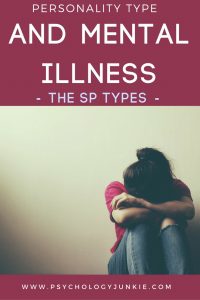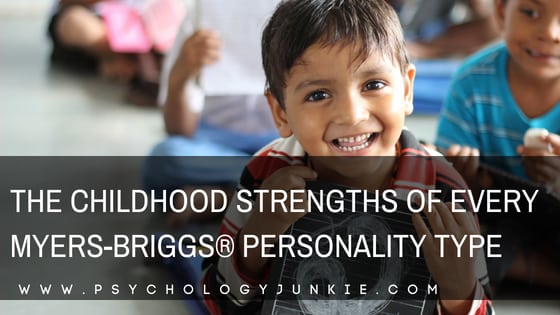Myers Briggs and Mental Illness Part 3 – The Artisans
Is there a link between certain Myers Briggs types and mental illness? This question gets asked a lot, and I wanted to find some answers. For months I’ve been researching any information I could find to see if there’s a correlation between type and mental distress.
I used to have a long post detailing all the research I found about type and mental illness here, but I think at this point it might be better to leave this page alone since too many people have drawn incorrect conclusions between type and mental illness and that can be dangerous. I believe if you are suffering from a mental illness (or are afraid that you are) then talking to a professional counselor would be the best option.

Here is an article you might find helpful:
The Unhealthy Coping Mechanisms of Every Personality Type
If you are feeling depressed,
Text CONNECT to 741741
I will leave some sources here in case anyone is interested in checking them out:
An Empirical Investigation of Jung’s Psychological types and Personality Disorder Features – Case Study
Journal of Psychological Type
The 16 Types – web page
Nurture by Nature – Understanding Your Child’s Personality Type – And Become a Better Parent by Paul D. Tieger and Barbara Barron-Tieger
Please Understand Me II by David Kiersey
Was That Really Me? How Everyday Stress Brings Out Our Hidden Personality by Naomi Quenk









Love this article, I found it interesting that not many ISFPs are linked to mental illnesses. I’m an ISFP with depression and I thought that many of us were prone to something.
Thank you for responding! Unfortunately, there isn’t a lot of research done on this subject so what I had to go on was very limited. It may be possible that ISFPs struggle in particular with depression, but I just couldn’t find a lot of information in my research. Plus I wanted to have as much empirical evidence as possible, and that was really hard to find. I’m really sorry that you have struggled with depression – is there any particular thing that has helped you? Thank you for visiting my page and giving me your thoughts!
Interesting, I’ve actually been wondering if there were links between personalities and mental illnesses, since logically, as mental disorders are usually due to how our brain processes internal and or external situations, it would somehow make sense. I’m a highly perfectionistic INTJ who puts A LOT. of pressure on myself. I’m in my first year and first week at law school and I’m already getting really anxious and making crazy study schedules and trying to get ahead as much as possible. The fact that I always strive for perfection and bettering myself led me into severe anorexia. I’m still struggling with my eating disorder, have always had anxiety issues, and depression. I’ve often been told by my psychologist and parents that I am very smart at internally analyzing my thoughts and feelings and trying to understand why I feel this way. For example, I tend to analyze the internal factors ( anxiety, need for control, perfectionism) and the external ones ( being bullied since forever..) and link them together and with a cause/effect logic link them to my feelings and behviors. A few weeks later I’ ll show up at my psychologist’s and draw an outline of all this and then I’ll try to find solutions to tackle the issues, and most of the time it works! So I really do think there might be some sort of link , between the though process, our personality, and disorders.
Thank you Elle, for responding and giving me your thoughts! I am so sorry that you have dealt with bullying, and are still dealing with anxiety and depression. I really hope that your psychologist can help you, and it sounds like you’re doing an incredible job of trying to understand the problems yourself. I think INTJs are extremely analytical and intelligent people, every INTJ I’ve met has been. Good luck in law school and in all your endeavors! Let me know if things get better! I hope they do!
Your description of depersonalization is quite misleading. It is more simply feeling detached from yourself, feeling like you are not yourself, or not being present. It does not necessarily have anything to do with being callous and uncaring though that MAY be one result. It is usually a reaction to severe stress and common in trauma survivors.
You are absolutely right, I read it just now and thought “that doesn’t seem right!”. I wrote this post quite a while ago and I think I got the description of depersonalization from a source that didn’t have it quite right. I’ve learned more about it since then and didn’t remember that I’d put this description of it in here. I’ll change that, thank you for noticing and letting me know!
This article is very precise. What characterizes ISTP is a need for freedom, a strong but non-invasive ego allied to a strong need for sensations and to a lesser degree, an interest for analysis and creation (constant evolution of the last two attractions with age). In this sense the special forces are the ideal place for an ISTP within the army. The internal structure (on form or background) is more flexible and discretion, autonomy, initiative or critical thinking are not an option. The army understood very well the different types, because it is possible to directly integrate the special units if the profil correspond. An ISTP with a superior intelligence will be not adapted in a conventional regiment. Over time, stress and behaviors that are not suited to community life will be added. I also think that a persistent externary sensory charge can cause damage like PTSD due to the Se Auxiliary. I’m personally very sensitive to the invasive and regular sounds which disturb my Ti and Ni. Special units intervene intensely but sporadically which corresponds to the need for withdrawal and quietness of ISTPs after an action.
I also think that the main enemy of ISTP is loneliness (avoiding and schizoidy personality risk). In this sense he can seeks to integrate institutions which will break, by the force, this pronounced tendency. The antisocial personality intervenes essentially in the case of childhood maltreatment. Even if there are in fact many variations and comorbidity (Psychopathy Checklist of Dr Hare or the 5 subtypes of ASPD by Theodore Millon)
Specifying that each unit includes trades specially adapted to ISTPs such as reconnaissance or high-precision shooting…
ESTPs mental disorder is NPD. Narcissist Personality Disorder. How do you not know that?